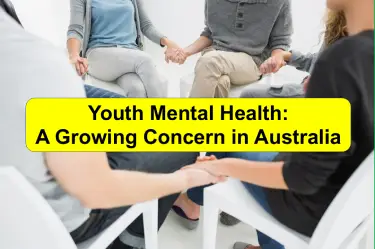Description
Explore youth mental health concerns in Australia. Learn how 30% of youth identify it as a top issue and how to foster a compassionate political system.
Introduction
Youth mental health has become an increasingly pressing issue in Australia. Recent surveys reveal that 30% of young Australians identify mental health as one of the most critical issues, slightly down from 34% in 2022 and 35% in 2021. Furthermore, 32% of young people are extremely or very concerned about their mental health. This article explores the current state of youth mental health, contributing factors, and potential solutions, aiming to provide readers with valuable insights and actionable advice.
1. The State of Youth Mental Health
Survey Data Analysis
In recent years, youth mental health has consistently ranked as a top concern in Australia. The 2023 survey data shows that 30% of youth consider mental health a significant issue. Although there is a slight decline from 34% in 2022 and 35% in 2021, the numbers are still alarmingly high. Additionally, 32% of young Australians express extreme or very high concern about their mental health, highlighting the urgent need for effective interventions.
Comparative Analysis
Comparing these statistics with previous years, youth mental health is still a critical concern despite the slight decline. Other key issues named by youth include climate change, employment, and education, but mental health consistently ranks among the top concerns. This persistence underscores the necessity of addressing the root causes and providing adequate support for young Australians.
2. Factors Contributing to Youth Mental Health Concerns
Social Media and Technology
The pervasive influence of social media and technology significantly affects youth mental health. While digital connectivity offers numerous benefits, it also presents challenges such as cyberbullying, social comparison, and addiction. These factors can worsen feelings of anxiety, depression, and loneliness among young people.
Educational Pressure
Academic expectations and the pressure to succeed contribute to stress and mental health issues among youth. The competitive nature of the education system, combined with the need to balance academics and personal life, often leads to burnout and emotional distress.
Economic Uncertainty
The current job market poses significant challenges for young Australians. Economic instability, job insecurity, and financial stress are major contributors to mental health concerns. Many young people struggle to find stable employment, which affects their overall well-being and prospects.
Global Events
Global crises, such as the COVID-19 pandemic and climate change, have profound impacts on youth mental health. These events increase uncertainty and anxiety, making it crucial to address mental health issues proactively. Increased awareness and discussion of mental health issues have helped reduce stigma, but more work is needed.
3. Personal Concerns and Experiences
Case Study: Emma’s Journey Through Anxiety and Depression
Emma, a 19-year-old university student from Melbourne, shares her story of struggling with anxiety and depression. During her final year of high school, Emma felt immense pressure to perform well academically and secure a place at a prestigious university. The constant stress took a toll on her mental health, leading to anxiety attacks and feelings of hopelessness.
Upon starting university, Emma’s anxiety worsened. She found it difficult to balance her coursework with part-time work, which she needed to support herself financially. The pandemic further worsened her situation, as remote learning and social isolation left her feeling disconnected and alone.
Emma sought help from her university’s counselling services. She began attending regular therapy sessions and taking part in online support groups. These resources provided her with coping strategies and a sense of community. Over time, Emma learned to manage her anxiety and depression, although she acknowledges it is an ongoing journey.
Expert Opinions
Mental health professionals emphasize the importance of early intervention and continuous support. Dr. Jane Smith, a psychologist specializing in youth mental health, explains, “It’s crucial for young people to have access to mental health services before their issues escalate. Regular therapy sessions, peer support groups, and mindfulness practices can significantly improve their well-being.”
Dr. Smith advocates for integrating mental health education into school curricula to equip students with the tools to manage stress and seek help when needed. She also highlights the role of parents and educators in creating a supportive environment where young people feel safe discussing their mental health.
By giving real-life examples like Emma’s story and expert insights, we can better understand the personal impact of mental health issues on youth and the importance of accessible support systems.
4. Addressing Youth Mental Health
Current Initiatives
Several initiatives aim to support youth mental health in Australia. Programs like Headspace, Reach Out, and Beyond Blue provide crucial resources and support services for young people. These initiatives offer counselling, online resources, and community engagement activities to address mental health issues.
Gaps in the System

Despite these efforts, there are significant gaps in the mental health support system. Many young people still face barriers to accessing mental health services, such as long waiting times, lack of awareness, and stigma. Addressing these gaps is essential to ensure all young Australians receive the support they need.
Recommendations for Improvement
To improve youth mental health support, several actionable steps can be taken:
– Increase Funding: Allocate more public money to mental health programs and services.
– Enhance Education: Incorporate mental health education into school curricula to raise awareness and reduce stigma.
– Expand Access: Ensure mental health services are easily accessible and affordable for all young people.
– Community Engagement: Encourage community-driven initiatives to provide local support and resources.
5. The Role of Society
Community Support
Community engagement plays a vital role in supporting youth mental health. Local organizations, schools, and families can create supportive environments where young people feel safe discussing their mental health concerns. Community-driven initiatives, such as peer support groups and mental health workshops, have proven effective in providing support and reducing stigma.
Reducing Stigma

Combating the stigma surrounding mental health is crucial for encouraging open conversations and seeking help. Public awareness campaigns, educational programs, and personal stories can help normalize discussions about mental health and promote a culture of acceptance and support.
Conclusion
Summary of Key Points
Youth mental health is a significant concern in Australia, with 30% of young people naming it as a top issue. Factors such as social media, educational pressure, economic uncertainty, and global events contribute to these concerns. Despite existing initiatives, gaps in the support system remain, needing increased funding, education, access, and community engagement.
Call to Action
Join the conversation on youth mental health and support initiatives that make a difference. Share your thoughts and experiences using #YouthMentalHealthAU.
Future Outlook
With continued efforts to improve mental health support systems, there is hope for a brighter future for young Australians. By addressing the root causes and providing comprehensive support, we can help ensure the well-being of our youth.
Thought-Provoking Question
What steps do you think we, as a society, can take to better support the mental health of our youth?
Social Sharing
If you found this article helpful, please share it with your contacts and on social media using the hashtags below.

